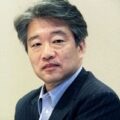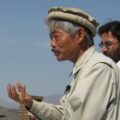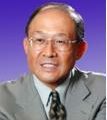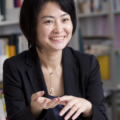A report on having accompanied the Pope during his stay in Japan—The voice of the voiceless
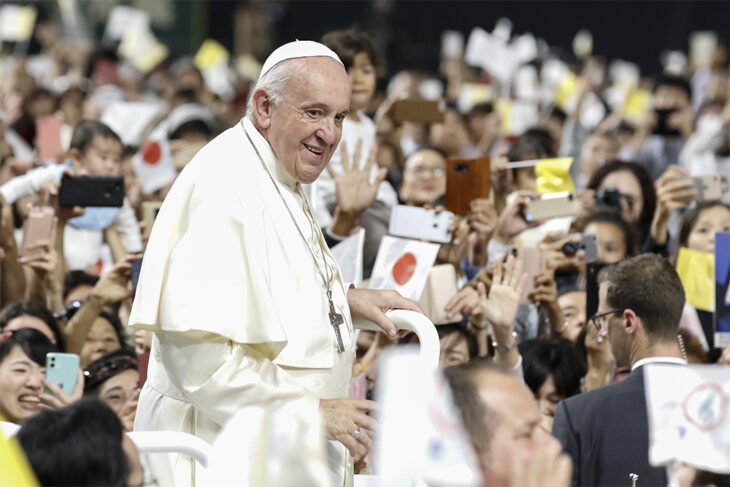
Pope Francis waves from the popemobile upon his arrival at Tokyo Dome to conduct a Holy Mass on November 25, 2019. Pope Francis also visited Nagasaki and Hiroshima to deliver a message against the nuclear weapons in the cities devastated by atomic bombs during World War II.
Photo: ZUMA Press/Aflo
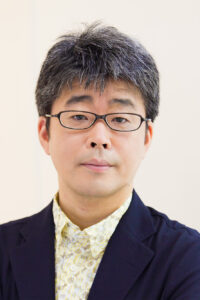
Wakamatsu Eisuke
Pope Francis visited Japan from November 23 to 26, 2019, staying in Japan for four days. This seems a short stay. But for the Pope, this was a long stay in one particular country.
I had heard long before that the Pope might visit Japan. 2019 marked a turning point in the relationship between Japan and the Catholic Church in several ways. Beyond that, however, the author also has the feeling that the Pope intended to transform various political tensions across Asia into harmonious relationships. In fact, the Pope stated in a regular press conference held in flight that he hoped to visit China.
The Pope’s visit to Japan was the first one in thirty-eight years, the second after Pope John Paul II’s visit in 1981.
Only considering that the Pope’s visit to Japan was an event in the context of the time, you can easily imagine that it is insufficient to just confirm what happened during the Pope’s stay in considering the meaning of the Pope’s visit. What he did not say is as important as what he said.
During the Pope’s visit to Japan, the author applied for press credentials and attended as many of the events as possible. The author was able to visit five sites: the martyrdom square of the twenty-six saints of Nishizaka Town, Nagasaki City, and the Hiroshima Peace Memorial Park on November 24, a Meeting with the victims of the Triple Disaster, held at Bellesalle Hanzomon Auditorium, a Mass in the Tokyo Dome on November 25 and a lecture for young people at Sophia University on November 26, the final day of the Pope’s visit.
Drafts of the speeches by the Pope and all of the speakers were handed out to the reporters at all of the sites.
The Pope’s words and actions can often have even more power than he expects. The Pope is the sovereign of Vatican City as well as the leader of 1.3 billion Catholics around the world. Of course, his words can sometimes create unignorable differences with the governments of countries he visits and can develop into international issues from time to time. Even the things he says in the Vatican daily can interfere with the domestic affairs of other countries. The reading of prepared manuscripts is a way of preventing such situations.
The author entered the martyrdom square of the twenty-six saints of Nishizaka Town, the first location from which the author reported, more than three hours before the scheduled time of the Pope’s arrival. At first, it was cloudy. But it gradually began to thunder and the weather changed to a heavy rain. For security reasons, reporters were forbidden from using umbrellas, and the author had to wear a raincoat.
The reporters and other participants were required to stay in their seats from about 30 minutes before the Pope’s arrival. The rain was so heavy that the raincoat was of little help, and the author became drenched. The people sitting still there in the rain took on the appearance of ascetics.
Prayer is stronger than words
All of the public events held during the Pope’s visit to Japan were broadcast live on YouTube. If you just wanted to hear the Pope’s words and see his actions, it was not necessary to attend. But while waiting in the rain, the author noticed that this way of thinking was only focused on efficiency.
It was not the reporting of a summary of the Pope’s remarks but of the atmosphere filling the venue and the depth of the silence that the author had to pass on to his audience.
Even before the Pope appeared, he was deeply connected with the waiting audience. The venue, which should have been growing colder in the late fall rain, gradually filled with enthusiasm. The video or other recordings couldn’t capture this atmosphere.
A large screen was set up at the Nishizaka site. It was intended mainly to project the Japanese subtitles of the Pope’s speech. As soon as the Pope arrived at the hypocenter of the atomic explosion in Nagasaki, his first destination, the cameras began broadcasting. The Pope exchanged greetings with everyone, and then placed flowers at the memorial for those killed in the atomic bombing. In addition to the flowers, the Pope prayed deeply, something the author cannot forget.
The sight of the Pope praying left an even stronger impact than all of the Pope’s words that the author had read prior to that moment. The author speculates that quite a few in the audience felt that this moment was exactly what prayer is about. We often see politicians offering flowers in prayer on television. But the scene I witnessed at that time was completely different.
The sight of the Pope praying with his head bowed deeply in the rain, immediately conjured in the author the image of their Majesties the Emperor Emeritus and Empress Emerita consoling the spirits of those killed in wars and disasters both at home and abroad. The Pope and their Majesties did not meet. But the author felt some link that could not be easily expressed there.
A meeting with the victims of the nuclear power plant accident in Fukushima
At a Meeting with the victims of the Triple Disaster in Hanzomon in Tokyo, second-year high school student Kamoshita Matsuki spoke about the accident at the nuclear power plant in Fukushima. This young man had already met the Pope in March 2019. He had sent a letter explaining his plight to the Pope and was invited to Vatican City. His speech started as scheduled, but during the speech, he went off-script, saying, “Nuclear power is a national policy. That is why the compensation and evacuation zoning were determined in accordance with the will of the government that wants to maintain that policy, which caused divisions between the victims. The people who were injured were led to hate their neighbors.”
The Pope appeared to quickly notice the change in the tone of the young man’s voice. Of course, this does not mean that the Pope understood Japanese, but the Pope did not miss the change in the tone of the high school student’s voice. To put it in words, the voice from his throat turned into a voice from his stomach. The Pope instantly looked at the young Japanese man with passionate eyes.
Following three Japanese speakers, including the high school student, the Pope began to speak. But the Pope did not directly mention the speech made by the high school student. The Pope said that what was necessary for true recovery was meetings between ordinary citizens.
The Pope said, “Meeting not only the people who help reconstruct towns but also the friends who help rebuild aspirations and hope, and brothers and sisters is crucial.”
The phrase “brothers and sisters” in this context is an expression characteristic of the Catholic Church that means brothers and sisters at heart. Becoming a person who can think of others’ issues as if they are your own and meeting others like this will illuminate the path to recovery in a true sense of the word.
After his speech, the Pope exchanged words with the other speakers. The Pope firmly shook the hands of two of the speakers, and hugged the young Japanese man as if they were old friends.
The word old friend is not entirely a figure of speech. The Pope was there to meet “friends” who had been hurt but continued to face their futures with an unrelenting spirit, symbolized by the high school student.
During his stay in Japan, the Pope avoided making any statements about the ongoing use of nuclear power. But the Pope stated in the presence of press reporters on the return flight that nuclear power should not be used unless its safety was truly verified, but clearly expressing that this was his own personal view. The Pope made an in-depth statement about nuclear weapons and even stated that the end of their existence should become doctrine.
The Pope also made a strong statement about the hypocrisy of the so-called “nuclear umbrella” from the hypocenter of the atomic explosion in Nagasaki.
Our world is marked by a perverse dichotomy that tries to defend and ensure stability and peace through a false sense of security sustained by a mentality of fear and mistrust, one that ends up poisoning relationships between peoples and obstructing any form of dialogue.
(“A Message about Nuclear Weapons” from To Protect All Life)
Japan cannot use its non-possession of nuclear weapons as an excuse. Our world tries to defend and ensure stability and peace through a false sense of security sustained by a mentality of fear and mistrust. The Pope declares that Japan can take a different path.
A special feeling for Japan
In his first remarks upon his arrival in Japan, the Pope said, “I don’t know if you are aware of this, but ever since I was young I have felt a fondness and affection for these lands. Many years have passed since that missionary impulse, whose realization has been long in coming.” (“A Meeting with the Bishops of Japan” from To Protect All Life), expressing his special feeling for the country.
Francis is the name he assumed as Pope, but he was born Jorge Mario Bergoglio to a family of Italian immigrants in Buenos Aires, the capital of Argentina. At the age of 21, he joined the Society of Jesus, whose founders included St. Francis Xavier (1506–52), and became a Catholic priest.
Japan was an awe-inspiring special place to foreign missionaries. It was not only associated with St. Xavier but also continued to hold its belief in Christianity even after the Anti-Christian Edicts issued by Toyotomi Hideyoshi (1537–98) and Tokugawa Ieyasu (1543–1616). The young Bergoglio knew that Catholics were religious minorities in modern Japan.
But the history of missionary work shows that Christianity in Japan has become extraordinarily enthusiastic. His hope was to fan that flame of enthusiasm again and send a smoke signal of belief.
After taking the path of the Catholic priesthood, Bergoglio hoped to go to Japan as a missionary. But his wish did not come true. His health condition was one of the reasons why he could not come to Japan at that time. It is difficult to imagine from his travels around the world at his age of over 80 now, but he had an operation in which some parts of his right lung were removed.
The Pope made the following statement at a meeting with the Bishops of Japan:
“I am here as a missionary pilgrim in the footsteps of great witnesses to the faith. It has been 470 years since St. Francis Xavier arrived in Japan, which marked the beginning of the spread of Christianity in the country. I would like to appreciate the Lord together with you in commemoration of him.”
This was the second visit by a Pope to Japan. In 1919 the first apostolic delegate to Japan was appointed, and 2019 marked 100 years of relations between Japan and the Holy See.
A part of the above-mentioned statement says, “I am here as a missionary pilgrim in the footsteps of great witnesses to the faith.” The Pope represented the most symbolic embodiment of this when he visited the martyrdom square of the twenty-six saints of Nishizaka Town.
In a speech starting with “I have very much looked forward to this moment. I have come here as a pilgrim to pray, to confirm you in the faith, and to be confirmed by the faith of these brothers and sisters who by their witness and devotion light up our path,” the Pope stated:
“Let us speak out and insist that religious freedom be guaranteed for everyone in every part of our world. Let us also condemn the manipulation of religions.”
(“A Courtesy Visit to Martyrs” from To Protect All Life)
The passage “in every part of our world” is important in this context. The Pope expressed his strong hope for “religious freedom,” not limited to Christianity, to be guaranteed for everyone.
Some people are persecuted and killed because they are Christians. Of course, some people other than Christians are persecuted because they belong to a community with strong faith.
While listening to the words of the Pope, the author could not help thinking of the people of Tibet and the Uyghurs in China. This is because it is not only suppression of ethnicities, but also a suppression of Buddhism and Islam that we are now witnessing.
The Pope’s speech in Hiroshima
During the Pope’s speech in Hiroshima, keen attention was paid to his remarks about nuclear weapons. But what struck me so strongly that I could not move was that the Pope mentioned the poor in the speech.
[…] I have come to this place of memory and of hope for the future, bringing with me the cry of the poor who are always the most helpless victims of hatred and conflict.
It is my humble desire to be the voice of the voiceless, who witness with concern and anguish the growing tensions of our own time.”
(“A Meeting for Peace” from To Protect All Life)
The poor’s lives are in danger. They appeal to the world for the existence of life through their own existence. The Pope travels around the world to convey the voice of these people.
The Pope opposes everything that threatens life. The Pope stands against the phenomena, values and powers that shake the dignity of life. The Pope believes that life is the root of human existence, equally given to everyone by God and that damage done to the lives of humans by other humans must never be permitted.
The abolition of the death penalty
The Pope also made a decision that was one step farther than previous popes have gone regarding the abolition of the death penalty. The Pope stated that disapproval of the death penalty should be doctrine. At the same time, Japan approves of the death penalty. We know that many death sentences have been carried out in the twenty-first century alone.
There had been hearing news reports that the Pope may meet Hakamada Iwao, who currently insists on his innocence in the face of a death sentence and is appealing, seeking a retrial.
But their dialogue did not come true for some unknown reason.
This does not mean, however, that the Pope remained silent about the abolition of the death penalty. Details were not announced, but according to Vatican News, the official media organization of Vatican City, in a meeting with Prime Minister Abe Shinzo, the Pope spoke about many issues surrounding prisoners, including issues relating to trials, the death penalty, life imprisonment, excessive internment beyond the capacity of prisons and detention before judgment, including about circumstances in other countries.
The mass held in the Tokyo Dome with about 50,000 people in attendance was literally solemn. To put it in more precise terms, it was not a mass by the Pope, but a mass whose center was the Pope. It even seemed that power condensed within the people in attendance as the mass progressed.
In the sermon, the Pope warned against missing the meaning of life and becoming a “slave of unhappiness.” The Pope also stated, selfishness “pursues only individual happiness. But in reality, it leaves us profoundly unhappy and enslaved, and hinder[s] the authentic development of a truly harmonious and humane society.” The Pope implored the vulnerable and the abandoned to search for secret power with eyes of love.
Learning from the poor
In the above-mentioned lecture he gave immediately after his arrival, the Pope mentioned that more than half of the Catholics in Japan were foreign workers and their families. But in the mass as well, the Pope emphasized that the churches of Japan must be churches for the people living in Japan and not churches for the Japanese.
The Pope asserted that churches must be “open to everyone.” If a church closes its doors, it does not deserve to be called a church.
Of course, the issue of immigrants and refugees lies in this. At a meeting with young people at Tokyo’s St. Mary’s Cathedral, the Pope proposed that Japan create policy that is more tolerant toward immigrants and refugees.
During his stay in Japan, the Pope tried as hard as possible to lead our eyes to a lower place through many different means of expression. The Pope did not say that we must give charity to the poor. The Pope preached that it was the mission of Christians to create a society in which we can coexist with those people. In addition, the Pope preached that we must learn from the poor.
As discussed above, when the Pope mentions the poor or the vulnerable, he always considers the lives that are in danger. Of course, this also includes those who are not recognized as immigrants or refugees.
The Pope’s lecture at Sophia University on the final day of his visit to Japan was perfectly fit to be the close of his trip. The Pope spoke about the possibilities of Japanese culture and preached that wisdom should stand close to the vulnerable and the poor.
In every situation, even the most complex, may they be concerned that their conduct is just and humane, conscientious and responsible, and show themselves resolute defenders of the vulnerable. May they be known for the integrity so greatly needed in these times when words and actions are often either misleading or deceitful.
(“Visiting Sophia University” from To Protect All Life)
The Pope urged young people not to create a world of their own but to take a step forward toward an invisible world.
The author speculates that these words were not directed at only young people. The author believes that we, adults, must also get out of the small worlds of our own making. It is adults that must change. The author felt that this was what the Pope was preaching.
Translated from “Shinja 13 okunin ‘Roma Kyoko’ rainichi dokouki (A report on having accompanied the Pope during his stay in Japan),” Bungeishunju, January 2020, pp. 178–184. (Courtesy of Bungeishunju, Ltd.) [March 2020]
Note: this article is partially rewritten by the author based on the original published in Bungeishunju.
Keywords
- Wakamatsu Eisuke
- Pope Francis
- Catholic Church in Japan
- Nishizaka
- Nagasaki
- Hiroshima Peace Memorial Park
- Fukushima
- nuclear power
- death penalty
- immigration
- refugees
- the poor
